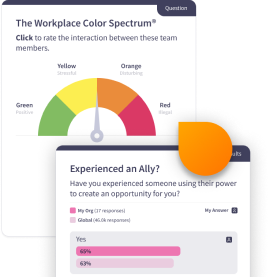
Measure Compliance Culture
A stereotype is an unjust and narrow-minded belief that unfairly generalizes a specific group of individuals or objects based on certain characteristics or expectations. It is universally known that mocking and perpetuating stereotypes about other ethnic groups is unacceptable. However, it's equally important to uphold this principle for your own ethnic background. Remember, ethnicity is a legally protected trait that merits respect and understanding.
Microlesson DescriptionGet an assessment of your compliance culture with this new diagnostic survey. Videos set the stage for testing on concepts around trust, accountability, decision making, and norms of behavior. In addition to gauging these 4 indicators of ethical behavior, the lesson includes five questions that support the DOJ's recommendations that employers measure employee sentiment with an engagement survey. An Insights Report of aggregated results provides benchmarking and captures a record of employee sentiment.
Key Concepts- Using diagnostic questions that measure ethical behaviors
- Employee sentiment questions around compliance processes
- Engage users through quality content about ethics and compliance with provocative workplace scenario videos
Microlesson Features
- Employee sentiment pulsing questions that provide leaders with insights into their workforce's core cultural competencies
- Emtrain's Expert Answers tool, enabling employeees to submit anonymous questions about sensitive issues.
- Rich, contemporary video scences illustrating key concepts through realistic scenarios
- A data driven, skill-based approach to eLearning that establishes a shared language for employees.

Related Resources
Related Microlessons
Frequently Asked Questions about Ethics Diagnostic
Below are answers to common questions that employees and managers have about this topic. These FAQs provide a preview of what you’ll learn in this microlesson and why it matters.
